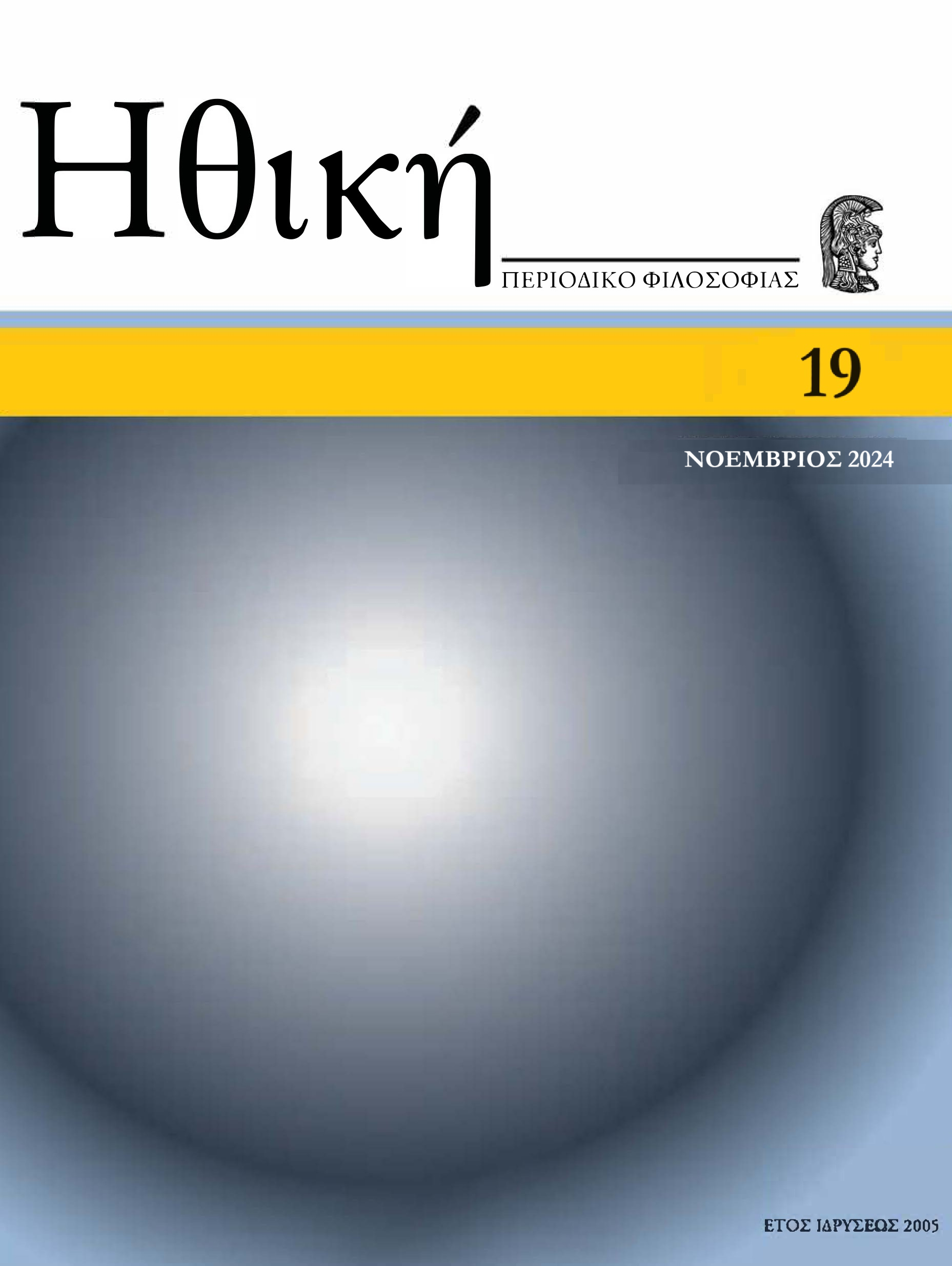Γράφοντας τον αλγόριθμο του Καλού: Η Τεχνητή Νοημοσύνη ως μηχανή απόδοσης Δικαιοσύνης

Περίληψη
Ένα από τα πιο ενδιαφέροντα και προκλητικά ζητήματα της Ηθικής της Τ.Ν. που θα κληθούμε να αντιμετωπίσουμε στο άμεσο μέλλον έχει να κάνει με την κατασκευή και χρήση υπολογιστικών συστημάτων για ρυθμιστικούς σκοπούς και, συγκεκριμένα, συστημάτων Τ.Ν. που θα προβαίνουν στη λήψη αποφάσεων ηθικής ή νομικής φύσης, συμμετέχοντας καθοριστικά στη λειτουργία απόδοσης Δικαιοσύνης. Η λήψη αποφάσεων per se, δεν συνιστά εν πρώτοις οξύ πρόβλημα, καθώς ήδη εφαρμογές Τ.Ν., που χρησιμοποιούμε στην καθημερινότητά μας, λαμβάνουν αποφάσεις οι οποίες ενδεχομένως να έχουν εμμέσως κάποιον ηθικό αντίκτυπο, όμως τα κριτήρια λήψης των αποφάσεών τους δεν είναι ηθικά ή νομικά και o ρόλος τους παραμένει κατά βάση εισηγητικός. Σε αντίθεση με τέτοιου τύπου «Εισηγητικά Συστήματα Τ.Ν.», στο μέλλον είναι πολύ πιθανό να δημιουργηθούν «Ρυθμιστικά Συστήματα Τ.Ν», δηλαδή συστήματα που δεν θα εισηγούνται απλώς, αλλά θα λαμβάνουν τα ίδια αποφάσεις, με βάση ηθικά κριτήρια ή κριτήρια δικαίου εν γένει, και θα μπορούν να χρησιμοποιηθούν στο άμεσο μέλλον για νομοθετικό έργο, απόδοση δικαιοσύνης, καθορισμό κυβερνητικών ή εταιρικών πολιτικών ή ακόμα και για αξιολόγηση της καθημερινής μας συμπεριφοράς.
Πρέπει να διευκρινιστεί, δε, ότι, σε αντιδιαστολή προς τα Ρυθμιστικά Συστήματα Τ.Ν., τα Εισηγητικά Συστήματα Τ.Ν, όπως οι νομικές εφαρμογές που χρησιμοποιούνται επί του παρόντος, προβαίνουν σε εισηγήσεις τις οποίες ο αλληλεπιδρών με τα συστήματα αυτά άνθρωπος δεν είναι υποχρεωμένος να ακολουθήσει, παρ’ ότι σε ορισμένες περιπτώσεις αισθάνεται «ότι πρέπει» να ακολουθήσει λόγω της επάρκειας και του βαθμού πληρότητας των συστημάτων αυτών. Στην περίπτωση, ωστόσο, των Ρυθμιστικών Συστημάτων Τ.Ν., οι «έξοδοί» (output) τους δύναται να είναι αποφάσεις με τις οποίες οι άνθρωποι θα είναι υποχρεωμένοι να συμμορφώνονται απαρέγκλιτα, ακόμα και επί τη βάσει ενός θεσμικού πλαισίου που θα επιβάλλει στους ανθρώπους την ευθυγράμμιση με τις αποφάσεις των Ρυθμιστικών Συστημάτων Τ.Ν. Όπως δείχνουμε στο παρόν δοκίμιο, η επιλογή, ως προς το αν οι «έξοδοι» αυτές θα έχουν τον χαρακτήρα απλών εισηγήσεων ή αναπόδραστων αποφάσεων, ισοδυναμεί ουσιαστικά με μια επιλογή ως προς τον βαθμό αυτονομίας που θα διακρίνει τα εν λόγω συστήματα. Αν οι «έξοδοι» συνιστούν απλές εισηγήσεις, τότε έχουμε μια περιορισμένη αυτονομία από μέρους του Ρυθμιστικού Συστήματος Τ.Ν., καθώς καθότι θα εξακολουθεί η όποια εισήγηση, ως τέτοια, να επιζητά την τελική αξιολόγηση και τελικά έγκριση ή απόρριψη από τον άνθρωπο χρήστη —π.χ. από έναν νομοθέτη ή δικαστή. Απεναντίας, αν οι «έξοδοι» αποτελούν αποφάσεις προς αναπόδραστη εκτέλεση, τότε ο ρόλος ανθρώπινου παράγοντα, νομοθέτη ή δικαστή, καθίσταται κενός περιεχομένου και ως εκ τούτου έχουμε απόλυτη αυτονομία του συστήματος Τ.Ν.
Λεπτομέρειες άρθρου
- Πώς να δημιουργήσετε Αναφορές
-
Γούναρης Ά., & Κωστελέτος Γ. (2024). Γράφοντας τον αλγόριθμο του Καλού: Η Τεχνητή Νοημοσύνη ως μηχανή απόδοσης Δικαιοσύνης. Ηθική. Περιοδικό φιλοσοφίας, (19). https://doi.org/10.12681/ethiki.39654
- Τεύχος
- Αρ. 19 (2024)
- Ενότητα
- Άρθρα
- Οι Συγγραφείς διατηρούν τα Πνευματικά Δικαιώματα και χορηγούν στο περιοδικό το δικαίωμα της πρώτης δημοσίευσης ενώ ταυτόχρονα τα πνευματικά δικαιώματα της εργασίας προστατεύονται σύμφωνα με την Creative Commons Attribution License που επιτρέπει σε τρίτους - αποδέκτες της άδειας να χρησιμοποιούν την εργασία όπως θέλουν με την προϋπόθεση της διατήρησης των διατυπώσεων που προβλέπονται στην άδεια σχετικά με την αναφορά στον αρχικό δημιουργό και την αρχική δημοσίευση σε αυτό το περιοδικό.
- Οι Συγγραφείς μπορούν να συνάπτουν ξεχωριστές, και πρόσθετες συμβάσεις και συμφωνίες για την μη αποκλειστική διανομή της εργασίας όπως δημοσιεύτηκε στο περιοδικό αυτό (π.χ. κατάθεση σε ένα ακαδημαϊκό καταθετήριο ή δημοσίευση σε ένα βιβλίο), με την προϋπόθεση της αναγνώρισης και την αναφοράς της πρώτης δημοσίευσης σε αυτό το περιοδικό.
- Το περιοδικό επιτρέπει και ενθαρρύνει τους Συγγραφείς να καταθέτουν τις εργασίες τους μέσω διαδικτύου (π.χ. σε ένα ακαδημαϊκό καταθετήριο ή στους προσωπικές τους ιστοσελίδες) πριν και μετά από τις διαδικασίες της δημοσίευσης, καθώς αυτό μπορεί να οδηγήσει σε παραγωγική ανταλλαγή ιδεών και σκέψεων καθώς επίσης και σε γρηγορότερη και μεγαλύτερη χρήση και ευρετηρίαση της δημοσιευμένης εργασίας (See The Effect of Open Access).



